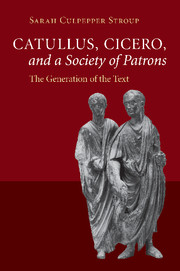Book contents
- Frontmatter
- Contents
- Preface and acknowledgments
- List of abbreviations
- Introduction
- I HOW TO WRITE ABOUT WRITING
- II THE TEXTUALIZATION OF DISPLAY
- III THE MATERIALIZATION OF THE TEXT
- 7 An object of Catullan affection
- 8 Brutus: the dialogic personification of the Republican voice
- Epilogue
- Appendix: What “Society of Patrons”? A prosopography of the players
- Bibliography
- Index locorum
- Index rerum et nominum
8 - Brutus: the dialogic personification of the Republican voice
Published online by Cambridge University Press: 04 August 2010
- Frontmatter
- Contents
- Preface and acknowledgments
- List of abbreviations
- Introduction
- I HOW TO WRITE ABOUT WRITING
- II THE TEXTUALIZATION OF DISPLAY
- III THE MATERIALIZATION OF THE TEXT
- 7 An object of Catullan affection
- 8 Brutus: the dialogic personification of the Republican voice
- Epilogue
- Appendix: What “Society of Patrons”? A prosopography of the players
- Bibliography
- Index locorum
- Index rerum et nominum
Summary
CICERO, WRITE SOMETHING
As I discussed in Chapter 6, Cicero inserts the unmistakable echoes of elite performance into de Oratore in order to introduce into the isonomic exchanges of his elite readers a new type of text that served as a venue of secondary and private display. In this chapter, I argue that Brutus too embodies a kind of social display, a recognizable textual echo of elite and private ritual. However, instead of a ritual concerned with the education of Roman youth and the sharing of erudite wit, Brutus presents an array of interlocking rituals that speak both to Cicero's own pressing political circumstances and the ultimate inevitability of his textual endeavors. In crafting a strangely gendered image of both the “death” of Republican oratory and the subsequent “life” of private textual circulation and collection – what de Bury would describe in the fourteenth century as the “community of books” or librorum municipium – Cicero fashions in Brutus a boldly procreative model for the writing of rhetorical histories and historical dramas in prose.
Composed and published in 46 BCE, the dialogue is set in the immediate present. Pompey's humiliating defeat at Pharsalus in 48 is a fresh wound on Cicero's mind, and although he had gained pardon by Caesar in the autumn of 47, Caesar's recent victory at Thapsus in April of 46 had left the orator's position anything but secure.
- Type
- Chapter
- Information
- Catullus, Cicero, and a Society of PatronsThe Generation of the Text, pp. 237 - 268Publisher: Cambridge University PressPrint publication year: 2010



